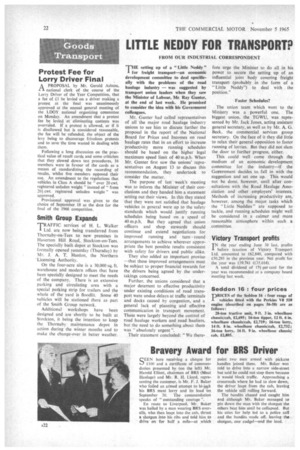LITTLE NEDDY FOR TRANSPORT?
Page 24

If you've noticed an error in this article please click here to report it so we can fix it.
FROM OUR INDUSTRIAL CORRESPONDENT 'THE setting up of a "Little Neddy "
1 for freight transport—an economic development committee to deal specifically with the problems of the road haulage industry — was suggested by transport union leaders when they saw the Minister of Labour, Mr. Ray Gunter, at the end of last week. He promised to consider the idea with his Government colleagues.
Mr. Gunter had called representatives of all the major road haulage industry unions to see him to discuss further the proposal in the report of the National Board for Prices and Incomes on road haulage rates that in an effort to increase productivity more running schedules should be based on the higher legal maximum speed limit of 40 m.p.h. When Mr. Gunter first saw the unions' representatives on August 13 to discuss this recommendation, they undertook to consider the matter.
The purpose of last week's meeting was to inform the Minister of their conclusions and they handed him a statement setting out their views. In this they stated that they were not satisfied that haulage vehicles in general were up to the safety standards which would justify running schedules being based on a speed of 40 m.p.h. But they agreed that union officers and shop stewards should continue and extend negotiations for improved running and turn round arrangements to achieve wherever appropriate the best possible results consistent with safety for drivers and public alike.
They also added an important proviso —that these improved arrangements must be subject to proper financial rewards for the drivers being agreed by the undertakings concerned.
Further, the unions considered that a major deterrent to effective productivity under existing conditions of road transport were undue delays at traffic terminals and docks caused by congestion, and a general lack of planning and effective communication in transport movement. These were largely beyond the control of road haulage workers and road hauliers, but the need to do something about them was " absolutely urgent ''.
Their statement concluded: "We there
fore urge the Minister to do all in his power to secure the setting up of an influential joint body covering freight transport (probably in the form of a "Little Neddy") to deal with the position."
Faster Schedules?
The union team which went to the Ministry was a powerful one. The biggest union, the TGWU, was represented by Mr. Jack Jones, acting assistant general secretary, as well as by Mr. A. G. Beck, the commercial services group secretary. On the face of it they did little to relax their general opposition to faster running of lorries. But they did not slam the door to further progress, either.
This could well come through the medium of an economic development committee for the industry—if the Goyernment decides to fall in with the suggestion and set one up. This would not be done, however, until after consultations with the Road Haulage Association and other employers' interests. Methods of increasing productivity are, however, among the major tasks which the "Little Neddies " are supposed to tackle, and running schedules might well be considered in a calmer and more reasonable atmosphere within such a committee.
Victory Transport profits
TN the year ending June 30 last, profits
before taxation of Victory Transport Ltd. amounted to £62,840, compared with 150,293 in the previous year. Net profit for the year was £39.741 (£35,014).
A total dividend of 17-1per cent for the year was recommended at a company board meeting last week.
Seddon 16 : four prices 1DRICES of the Seddon 16 : four range of 1 vehicles fitted with the Perkins V8 510 engine (described on pages 56-58) are as follows : 28-ton tractive unit, 9 ft. 3 in. wheelbase chassis/cab, £2,695; 16-ton tipper, 12 ft. 6 in. wheelbase chassis/cab, £2,719; 16-ton lorry, 14 ft. 8 in. wheelbase chassis/cab, £2,732; 16-Ion lorry, 16 ft. 9 in. wheelbase chassis/ cab, £2,805.




















































































































